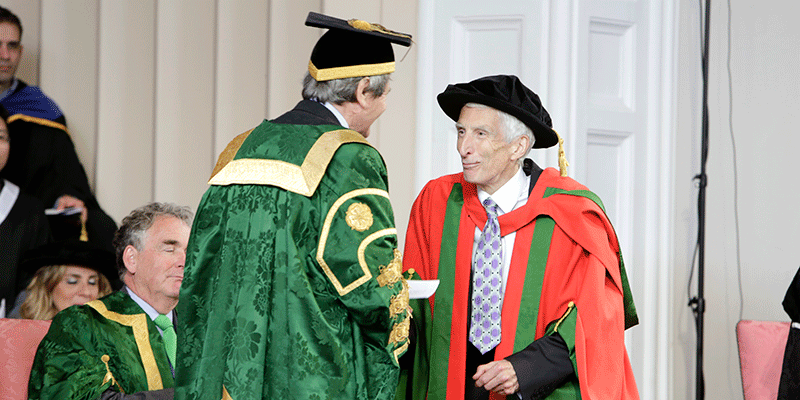Martin Rees

Presentation address by Professor Alan Watson
Chancellor,
Lord Rees of Ludlow is one of Britain’s major intellectuals. There is good evidence to support this claim, not least his membership of the Order of Merit, that exclusive group of 24 exceptional people chosen by the Queen. That he has achieved this status, whilst also being one of the world’s foremost astrophysicists, is particularly encouraging in an age when the world needs wise scientific counsel as never before.
Martin Rees has worked on some of the most challenging problems in astrophysics, including black holes, neutron stars, quasars and the radiation from the Big Bang. He completed his PhD studies at Cambridge in 1967, a time when physicists would sometimes say that cosmologists ‘are often in error but never in doubt!’ This jibe is now seldom heard as cosmology has become an exact science under the influence of such as Martin.
It is no exaggeration to say that Martin was precocious. After a short period at the University of Sussex, he was appointed Plumian professor of Astronomy at Cambridge at only 31. By this time he had published over 50 papers. When this move was announced I recall waiting for an erratum to appear in Nature stating that he was indeed much older. Once at Cambridge he is said to have formulated the view that all astronomy professors went crazy at around 55. To avoid being matched against this dictum he took up a Royal Society professorship at 49. In 2004 he became Master of Trinity College, a post he held for 8 years during which time he also served as President of the Royal Society – arguing quietly and effectively for the place of science in national priorities. He was appointed 15th Astronomer Royal in 1995: the duties of this post he describes as being so exiguous that they could be carried out posthumously.
While Martin continues his scientific work – his most recent paper addressed the production of high-energy neutrinos and gamma-rays in star-forming galaxies – he is increasingly in demand to give high-profile discourses such as the Reith Lectures and TED talks. In these presentations and in popular books, he has addressed, inter alia, the threats facing human civilisation in this century. He is hopeful that we will survive but has pointed out that the challenge of providing our planet with clean energy will require an investment comparable to that on the Manhattan Project. In today’s dollars this is about 27 billion, a figure comparable to the number of stars in our Galaxy. Astrophysicists are accustomed to thinking big, as Martin has certainly done through every facet of his career.
Chancellor, I present to you for the degree of Doctor of Science, honoris causa, Martin John Rees.